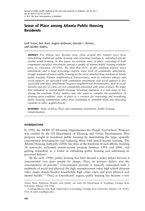0
Publication
Community:
Dec 17, 2018
In response to the heightened interest in the relationship between work and the health of individuals and communities, CMCS has clarified that Medicaid funds cannot be used to pay beneficiaries’ wages, but can pay for employment counseling as an optional benefit—to help people get jobs. Years of experience with work requirements for the Supplemental Nutrition Assistance Program, Aid to Families with Dependent Children, and populations with disabilities have developed the evidence for what is needed to help different populations find and keep jobs.
Authored by: Christopher F. Koller for Millbank Memorial Fund
Topics: Affordable Care Act, Disabilities, Health, Legislation & Policy, Low-income, Medicaid / Medicare, Research, Stability, Workforce development
 Shared by Mica O'Brien
Shared by Mica O'Brien
Mica O'Brien posted a
on Dec 17, 2018
Christopher F. Koller for Millbank Memorial Fund
In response to the heightened interest in the relationship between work and the health of individuals and communities, CMCS has clarified that Medicaid funds cannot be used to pay beneficiaries’ wages, but can pay for employment counseling as an optional benefit—to help people get jobs.
0
Publication
Community:
Dec 17, 2018
Stricter work requirement policies for the Supplemental Nutrition Assistance Program (SNAP) at the federal level were left out of the recently passed farm bill, but state policymakers are still considering whether to expand or establish their own work requirements for SNAP and Medicaid, with the goal of incentivizing employment. There’s no question that good jobs help spur upward mobility. But if we are serious about helping people work, we have to get serious about helping people improve their skills.
Authored by: Gina Adams and Shayne Spaulding for The Urban Institute
Topics: Child welfare, Cost effectiveness, Dual-generation, Early childhood, Food insecurity, Legislation & Policy, Low-income, Research, Stability, Workforce development
 Shared by Mica O'Brien
Shared by Mica O'Brien
Mica O'Brien posted a
on Dec 17, 2018
Gina Adams and Shayne Spaulding for The Urban Institute
Stricter work requirement policies for the Supplemental Nutrition Assistance Program (SNAP) at the federal level were left out of the recently passed farm bill, but state policymakers are still considering whether to expand or establish their own work requirements for SNAP and Medicaid, with the goa
0
Publication
Community:
Dec 14, 2018
Health and reentry are closely related, and chronic medical, mental health, and substance use problems make it harder for newly released people to seek employment, obtain housing, and avoid reincarceration. Compared with the general population, justice-involved people tend to be in poorer health and need access to physical and behavioral health services, as well as the know-how and motivation to get care.
Authored by: Rochisa Shukla and Kamala Mallik-Kane for Urban Institute
Topics: Affordable Care Act, Criminal justice, Health, Legislation & Policy, Low-income, Medicaid / Medicare, Research, Stability
 Shared by Mica O'Brien
Shared by Mica O'Brien
Mica O'Brien posted a
on Dec 14, 2018
Rochisa Shukla and Kamala Mallik-Kane for Urban Institute
Health and reentry are closely related, and chronic medical, mental health, and substance use problems make it harder for newly released people to seek employment, obtain housing, and avoid reincarceration.
0
Webinar
Community:
Dec 11, 2018
CLPHA’s Education Working Group hosts a webinar including presentations on efforts from the Chicago Housing Authority to work with residents on pursuing postsecondary opportunities, as well as an update from HUD’s Office of Policy Development & Research on data collection around tracking and increasing FAFSA utilization.
Authored by: CLPHA
Topics: CLPHA, Cost effectiveness, Data sharing, Education, Funding, Housing, Housing Is Working Group, Low-income, Metrics, Midwest, Post-secondary, Research, Stability, Youth
 Shared by Mica O'Brien
Shared by Mica O'Brien
Mica O'Brien posted a
on Dec 12, 2018
CLPHA’s Education Working Group hosts a webinar including presentations on efforts from the Chicago Housing Authority to work with residents on pursuing postsecondary opportunities, as well as an update from HUD’s Office of Policy Development & Research on data collection around tracking and inc
0
Publication
Community:
Dec 1, 2018
With collectively more than 100 years of policy expertise and values-based leadership between us, Ascend at the Aspen Institute and the Housing Opportunity and Services Together initiative at the Urban Institute partnered to develop a set of recommendations on how to harness assisted housing and public-private housing partnerships for better outcomes for families.
Authored by: The Urban Institute and ASCEND: The Aspen Institute
Topics: Dual-generation, Early childhood, Education, Family engagement, Health, Housing, Low-income, Place-based, Research, Stability
 Shared by Mica O'Brien
Shared by Mica O'Brien
Mica O'Brien posted a
on Dec 6, 2018
The Urban Institute and ASCEND: The Aspen Institute
With collectively more than 100 years of policy expertise and values-based leadership between us, Ascend at the Aspen Institute and the Housing Opportunity and Services Together initiative at the Urban Institute partnered to develop a set of recommendations on how to harness assisted housing and pub
0
Research
Community:
Nov 27, 2018
Most states use an education funding formula to allocate state and local dollars to school districts. Most funding formulas attempt to account for student poverty, among other factors, in distributing funds. But there are several ways to count low-income students and even more ways to tie dollars to these student counts.
Authored by: Kristin Blagg for The Urban Institute
Topics: Child welfare, Education, Legislation & Policy, Low-income, Place-based, Research, Stability, Youth
 Shared by Mica O'Brien
Shared by Mica O'Brien
Mica O'Brien posted a
on Nov 27, 2018
Kristin Blagg for The Urban Institute
Most states use an education funding formula to allocate state and local dollars to school districts. Most funding formulas attempt to account for student poverty, among other factors, in distributing funds.
0
Report
Community:
Mar 14, 2018
There were 33,889 homeless schoolchildren in Florida during the 2007–08 school year, including children temporarily doubled up with others and children staying in hotels, motels, shelters, transitional housing, and unsheltered locations. By the 2015–16 school year, that number had risen to 72,601. This report suggests that the rise is because of the recession and foreclosure crisis, the state’s increasing shortage of affordable housing, and school districts training teachers, counselors, and other staff to identify students with no permanent housing.
Authored by: The Shimberg Center for Housing Studies and Miami Homes for All
Topics: Data sharing, Education, Homelessness, Housing, Low-income, Research, South, Stability, Youth
 Shared by Mica O'Brien
Shared by Mica O'Brien
Mica O'Brien posted a
on Nov 21, 2018
The Shimberg Center for Housing Studies and Miami Homes for All
There were 33,889 homeless schoolchildren in Florida during the 2007–08 school year, including children temporarily doubled up with others and children staying in hotels, motels, shelters, transitional housing, and unsheltered locations. By the 2015–16 school year, that number had risen to 72,601.
0
Report
Community:
Oct 3, 2018
More than a third of homeless people are part of a family, most of which are headed by women with at least one child. Homeless families are different from single homeless people, and their needs differ. But limited research focuses on these families. This study aims to fill the gap by exploring longitudinal health service use and expenditures for homeless family members before and after entering an emergency shelter.
Authored by: Robin Clark, Linda Weinreb, Julie Flahive, and Robert Seifert for the American Journal of Public Health
Topics: Family engagement, Health, Homelessness, Housing, Low-income, Preventative care, Research, Stability
 Shared by Mica O'Brien
Shared by Mica O'Brien
Mica O'Brien posted a
on Nov 21, 2018
Robin Clark, Linda Weinreb, Julie Flahive, and Robert Seifert for the American Journal of Public Health
More than a third of homeless people are part of a family, most of which are headed by women with at least one child. Homeless families are different from single homeless people, and their needs differ. But limited research focuses on these families.
0
Report
Community:
May 1, 2018
The Enhanced Transitional Jobs Demonstration (ETJD), funded by the Employment and Training Administration of the U.S. Department of Labor, tested seven transitional jobs programs that targeted people recently released from prison or low-income parents who had fallen behind in child support payments.
Authored by: MDRC, OPRE, and Employment and Training Demonstration
Topics: Asset building, Cost effectiveness, Criminal justice, Legislation & Policy, Low-income, Research, Stability, Workforce development, Youth
 Shared by Mica O'Brien
Shared by Mica O'Brien
Mica O'Brien posted a
on Nov 19, 2018
MDRC, OPRE, and Employment and Training Demonstration
The Enhanced Transitional Jobs Demonstration (ETJD), funded by the Employment and Training Administration of the U.S.
0
Research
Community:
Nov 1, 2018
Are families prioritizing their housing payments by jeopardizing their health and well-being, missing utility payments, skipping meals, or failing to keep up with medical needs or medical bills? And are renters less able than homeowners to weather a financial emergency, such as an unexpected medical expense? Our research suggests this may be the case.
Authored by: Corianne Scally and Dulce Gonzalez for The Urban Institute
Topics: Asset building, Child welfare, Food insecurity, Health, Homelessness, Housing, Low-income, Research, Stability
 Shared by Mica O'Brien
Shared by Mica O'Brien
Mica O'Brien posted a
on Nov 7, 2018
Corianne Scally and Dulce Gonzalez for The Urban Institute
Are families prioritizing their housing payments by jeopardizing their health and well-being, missing utility payments, skipping meals, or failing to keep up with medical needs or medical bills?
0
Research
Community:
Oct 26, 2018
Researchers often have valuable insights for program leaders and policymakers. However, their research is typically presented in formats and contexts that don’t speak directly to those who can make the best use of it. With these short videos (about 3 minutes long each), we seek to bring relevant, timely research to everyone interested in reducing poverty and increasing family stability in the United States. Each video offers a few critical messages. Our hope is that these videos, and this viewer’s guide, provoke your thinking, expand your dialogue, and give you ideas for how to strategically advance your work.
Authored by: Scott W. Allard, Greg Fabiano, Colleen Heflin, Jodi Sandfort, and Valerie Uccellani for Mathematica
Topics: Family engagement, Low-income, Research, Stability
 Shared by Mica O'Brien
Shared by Mica O'Brien
Mica O'Brien posted a
on Nov 6, 2018
Scott W. Allard, Greg Fabiano, Colleen Heflin, Jodi Sandfort, and Valerie Uccellani for Mathematica
Researchers often have valuable insights for program leaders and policymakers. However, their research is typically presented in formats and contexts that don’t speak directly to those who can make the best use of it.
0
Research
Community:
Oct 25, 2018
Many low-income families in the United States face challenges associated with unemployment, health, and education disparities. To help overcome these challenges, several federal programs aim to assist these families with employment, self-sufficiency, healthy relationships, and individual well-being. Understanding the effects of these programs, including whether they meet the needs of those they intend to serve, requires a strong partner. Mathematica’s team of seasoned experts has worked closely with the Administration for Children and Families (ACF), Office of Planning, Research, and Evaluation (OPRE) to uncover the insights practitioners and policymakers need to make informed decisions.
Authored by: Mathematica
Topics: Asset building, Child welfare, Dual-generation, Family engagement, Low-income, Research, Stability
 Shared by Mica O'Brien
Shared by Mica O'Brien
Mica O'Brien posted a
on Nov 6, 2018
Many low-income families in the United States face challenges associated with unemployment, health, and education disparities.
0
Research
Community:
Oct 16, 2018
The evidence on how homelessness affects children suggests policymakers should be doing everything possible to prevent homelessness and, when families who do lose their housing, to help them exit homelessness and stabilize in housing quickly. Rapid re-housing (RRH) can help homeless families in crisis.
Authored by: Mary K. Cunningham for The Urban Institute
Topics: Child welfare, Health, Homelessness, Housing, Legislation & Policy, Low-income, Research, Stability
 Shared by Mica O'Brien
Shared by Mica O'Brien
Mica O'Brien posted a
on Nov 5, 2018
Mary K. Cunningham for The Urban Institute
The evidence on how homelessness affects children suggests policymakers should be doing everything possible to prevent homelessness and, when families who do lose their housing, to help them exit homelessness and stabilize in housing quickly.
0
Research
Community:
Nov 5, 2018
Using multiple panels from the US Census Bureau’s Survey of Income and Program Participation, we find that participation in Temporary Assistance for Needy Families, the Supplemental Nutrition Assistance Program (SNAP), or public health insurance reduces the number of hardships low-income families with children experience by 48 percent and reduces the share who experience food insufficiency by 72 percent.
Authored by: Signe-Mary McKernan and Caroline Ratcliffe for The Urban Institute
Topics: Child welfare, Cost effectiveness, Food insecurity, Legislation & Policy, Low-income, Medicaid / Medicare, Metrics, Research, Stability
 Shared by Mica O'Brien
Shared by Mica O'Brien
Mica O'Brien posted a
on Nov 5, 2018
Signe-Mary McKernan and Caroline Ratcliffe for The Urban Institute
Using multiple panels from the US Census Bureau’s Survey of Income and Program Participation, we find that participation in Temporary Assistance for Needy Families, the Supplemental Nutrition Assistance Program (SNAP), or public health insurance reduces the number of hardships low-income families w
0
Research
Community:
Oct 25, 2018
In contrast to the portrayal of homelessness as affecting people with behavioral health problems or low employment capacity, cycles of homelessness could reflect job shifts that bring a household in or out of poverty. To assess the connections between employment and homelessness, researchers focused on three topics: (1) employment and earnings before, during, and after adults used a homeless shelter; (2) changes in employment and earnings in connection to shelter entry and exit; and (3) employment and earnings differences between adults who are homeless as part of a family versus as individuals.
Authored by: Stephen Metraux, Jamison Fargo, Nicholas Eng, and Dennis Culhane for Cityscape
Topics: Asset building, Homelessness, Housing, Low-income, Research, Stability, Workforce development
 Shared by Mica O'Brien
Shared by Mica O'Brien
Mica O'Brien posted a
on Oct 25, 2018
Stephen Metraux, Jamison Fargo, Nicholas Eng, and Dennis Culhane for Cityscape
In contrast to the portrayal of homelessness as affecting people with behavioral health problems or low employment capacity, cycles of homelessness could reflect job shifts that bring a household in or out of poverty.
0
Report
Community:
Oct 24, 2018
CLPHA’s Housing Is Initiative is engaged in a number of cross-sector activities focused on developing partnerships, facilitating a community of practice, resource development, promoting best practices, online collaboration, policy and advocacy, and training and education. Read about recent activities in this Fall Update.
Authored by:
Topics: Child welfare, CLPHA, Community development, Cost effectiveness, Data sharing, Early childhood, Education, Family engagement, Funding, Health, Homelessness, Housing, Low-income, Medicaid / Medicare, Mental health, Partnerships, Place-based, Post-secondary, Research, Stability, Substance abuse, Workforce development, Youth
 Shared by Mica O'Brien
Shared by Mica O'Brien
Mica O'Brien posted a
on Oct 24, 2018
CLPHA’s Housing Is Initiative is engaged in a number of cross-sector activities focused on developing partnerships, facilitating a community of practice, resource development, promoting best practices, online collaboration, policy and advocacy, and training and education.
0
Research
Community:
Oct 1, 2018
Although the rental assistance programs varied, key themes emerged, including (1) most programs, recognizing the impact of housing stability on health outcomes, targeted populations served by state or local health and human services programs; (2) most programs served a growing number of households over time; (3) funding generally increased over time and most of it came from general revenue; and (4) programs involved collaboration between the housing and health and human services agencies to ensure clients’ needs were comprehensively met.
Authored by: Anna Bailey, Peggy Bailey, and Douglas Rice for the Center on Budget and Policy Priorities
Topics: Funding, Health, Housing, Legislation & Policy, Low-income, Partnerships, Place-based, Research, Stability
 Shared by Mica O'Brien
Shared by Mica O'Brien
Mica O'Brien posted a
on Oct 9, 2018
Anna Bailey, Peggy Bailey, and Douglas Rice for the Center on Budget and Policy Priorities
Although the rental assistance programs varied, key themes emerged, including (1) most programs, recognizing the impact of housing stability on health outcomes, targeted populations served by state or local health and human services programs; (2) most programs served a growing number of households o
0
Research
Community:
Oct 4, 2018
Housing providers and counselors in urban, suburban, and rural areas can help refugees and resettlement agencies navigate challenging rental markets, understand the evidence about how housing and neighborhoods matter, and prepare for long-term success as a renter or owner.
Authored by: Brianne Casey, Kimberly Burrowes, and Maya Brennan for Urban Institute
Topics: Community development, Housing, Immigrants, Research, Stability
 Shared by Mica O'Brien
Shared by Mica O'Brien
Mica O'Brien posted a
on Oct 4, 2018
Brianne Casey, Kimberly Burrowes, and Maya Brennan for Urban Institute
Housing providers and counselors in urban, suburban, and rural areas can help refugees and resettlement agencies navigate challenging rental markets, understand the evidence about how housing and neighborhoods matter, and prepare for long-term success as a renter or owner.
0
News Article
Community:
Sep 27, 2018
Nationally, resources for providing families with housing assistance are inadequate. DC is piloting a new approach, the DC Flexible Rent Subsidy Program (DC Flex), to test whether shallow (smaller than the average subsidy, over a defined period) and flexible subsidies can help more families maintain affordable, adequate housing.
Authored by: Mychal Cohen and Josh Leopold for Urban Institute
Topics: Cost effectiveness, East Coast, Housing, Low-income, Research, Stability
 Shared by Mica O'Brien
Shared by Mica O'Brien
Mica O'Brien posted a
on Oct 4, 2018
Mychal Cohen and Josh Leopold for Urban Institute
Nationally, resources for providing families with housing assistance are inadequate.
0
News Article
Community:
Oct 1, 2018
Some places lift children out of poverty. Others trap them there. Now cities are trying to do something about the difference.
Authored by: Emily Badger and Quoctrung Bui for The New York Times
Topics: Child welfare, CLPHA, Community development, Criminal justice, Housing, Low-income, Metrics, Mobility, Racial inequalities, Research, Stability, Youth
 Shared by Mica O'Brien
Shared by Mica O'Brien
Mica O'Brien posted a
on Oct 1, 2018
Emily Badger and Quoctrung Bui for The New York Times
Some places lift children out of poverty. Others trap them there. Now cities are trying to do something about the difference.
1
Research
Community:
Sep 19, 2018
About 20 percent of adults in sheltered homeless families have a disability, compared with 9 percent of all US adults, yet few studies have addressed the intersection of disability and housing instability. A recent study explored the relationship between disabilities and Supplemental Security Income (SSI)/Social Security Disability Insurance (SSDI) income that homeless families reported when they entered emergency shelters, as well as later outcomes, such as housing stability, self-sufficiency, and food insecurity. It also examined how housing interventions affect SSI/SSDI income receipt.
Authored by: Urban Institute
Topics: Disabilities, Homelessness, Housing, Low-income, Research, Stability
 Shared by Mica O'Brien
Shared by Mica O'Brien
Mica O'Brien posted a
on Sep 20, 2018
About 20 percent of adults in sheltered homeless families have a disability, compared with 9 percent of all US adults, yet few studies have addressed the intersection of disability and housing instability.
0
Case study
Community:
Jun 25, 2018
The King County Housing Authority (KCHA), in partnership with the Highline School District and the nonprofit social service organization Neighborhood House, launched the Student and Family Stability Initiative (SFSI) pilot program in 2013 to provide housing and employment supports to homeless and unstably housed families with children enrolled in Highline elementary schools. In 2016, KCHA contracted with the Urban Institute (Urban) to conduct a process and outcome evaluation of the program’s first three pilot years. This evaluation documents how SFSI works, who it serves, and how well it helps participants achieve housing stability. This report synthesizes findings from data collection conducted over approximately 10 months that included document review, interviews with SFSI stakeholders, and analysis of program and other relevant KCHA administrative data.
Authored by: Martha M. Galvez, Amanda Gold, and Sara McTarnaghan
Topics: Attendance, Dual-generation, Education, Family engagement, Housing, Low-income, Pacific Northwest, Partnerships, Place-based, Research, Stability, Workforce development, Youth
 Shared by Mica O'Brien
Shared by Mica O'Brien
Mica O'Brien posted a
on Sep 18, 2018
Martha M. Galvez, Amanda Gold, and Sara McTarnaghan
The King County Housing Authority (KCHA), in partnership with the Highline School District and the nonprofit social service organization Neighborhood House, launched the Student and Family Stability Initiative (SFSI) pilot program in 2013 to provide housing and employment supports to homeless and un
0
Report
Community:
Aug 9, 2018
The Colorado Coalition for the Homeless created the Denver Housing First Collaborative (DHFC) in 2003 with funding provided by a collaboration of federal agencies. The DHFC involved CCH as the lead agency, Denver Department of Human Services (DDHS), Denver Health (DHHA), Arapahoe House, the Mental Health Center of Denver (MHCD) and the Denver VA Medical Center. The DHFC is designed to provide comprehensive housing and supportive services to chronically homeless individuals with disabilities. Initial federal funding created the capacity to house and serve 100 chronically homeless individuals. The program uses a housing first strategy combined with assertive community treatment (ACT) services, providing integrated health, mental health, substance treatment and support services.
Authored by:
Topics: Cost effectiveness, Funding, Health, Homelessness, Housing, Pacific Northwest, Partnerships, Research, Stability, Supportive housing
 Shared by Housing Is
Shared by Housing Is
Housing Is posted a
on Aug 9, 2018
The Colorado Coalition for the Homeless created the Denver Housing First Collaborative (DHFC) in 2003 with funding provided by a collaboration of federal agencies.
0
Research
Community:
Aug 9, 2018
For almost two decades now, cities around the country have been demolishing traditional public housing and relocating residents to subsidized private market rental housing. In this paper, we examine sense of place, consisting of both community and place attachment, among a sample of Atlanta public housing residents prior to relocation.
Authored by:
Topics: Asset building, Housing, Legislation & Policy, Low-income, Mental health, Mobility, Research, South, Stability
 Shared by Housing Is
Shared by Housing Is
Housing Is posted a
on Aug 9, 2018
For almost two decades now, cities around the country have been demolishing traditional public housing and relocating residents to subsidized private market rental housing.
0
Research
Community:
Aug 1, 2018
This study draws on qualitative interview data to examine transitions into rent-assisted housing as they relate to diabetes self-management behaviors.
Authored by:
Topics: East Coast, Health, Homelessness, Housing, Low-income, Mental health, Metrics, Nutrition, Research, Stability
 Shared by Housing Is
Shared by Housing Is
Housing Is posted a
on Aug 1, 2018
This study draws on qualitative interview data to examine transitions into rent-assisted housing as they relate to diabetes self-management behaviors.




 Shared by Housing Is
on Aug 9, 2018
Shared by Housing Is
on Aug 9, 2018
 Shared by Housing Is
on Aug 9, 2018
Shared by Housing Is
on Aug 9, 2018
 Shared by Housing Is
on Aug 1, 2018
Shared by Housing Is
on Aug 1, 2018







